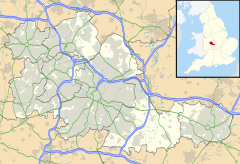King's Norton
| Kings Norton | |
|---|---|
 View of The Green |
|
| Kings Norton shown within the West Midlands | |
| Population | 24,380 (2011.Ward) |
| OS grid reference | SP049788 |
| Metropolitan borough | |
| Metropolitan county | |
| Region | |
| Country | England |
| Sovereign state | United Kingdom |
| Post town | BIRMINGHAM |
| Postcode district | B38 |
| Dialling code | 0121 |
| Police | West Midlands |
| Fire | West Midlands |
| Ambulance | West Midlands |
| EU Parliament | West Midlands |
| UK Parliament | |
Kings Norton, sometimes hypercorrected to King's Norton, is an area of Birmingham, England. Historically in Worcestershire, it is also a Birmingham City Council ward within the Government of Birmingham, England.
Kings Norton derives its origin from the basic Early English Nor + tun, meaning North settlement and belonging to or held by the king, when Kings Norton was the northernmost of the or outlying manors of Bromsgrove in Worcestershire. Before 1066 these manors with many others in Birmingham had belonged to Earl Edwin, the Anglo-Saxon Earl of Mercia. When in that year a Viking army sailed up the River Humber to invade England, Edwin went to do battle, but was heavily defeated at the Battle of Fulford Bridge near York. King Harold arrived the next day, and after defeating the Vikings at the Battle of Stamford Bridge, immediately marched back south to be himself defeated at the Battle of Hastings. Edwin and his broken remnant of an army were unable go with him. Thus, after the Norman Conquest, when William punished Harold's supporters, Edwin was not amongst them and did not forfeit his lands. Two years later, however, Edwin revolted against William who confiscated his holdings to give as rewards to his followers. Bromsgrove and its berewicks he kept, with himself both as tenant-in-chief and manorial lord. Thus the manor became Kings Norton remained royal from Domesday until 1804. [3]
...
Wikipedia

